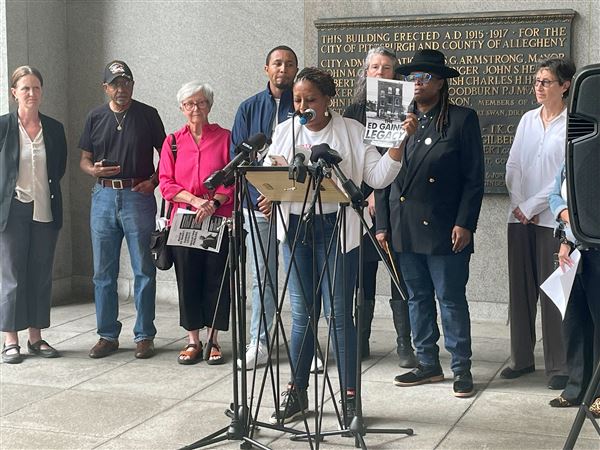In a first-of-its-kind report, an advocacy organization that ranked how well states care for inmates with serious mental illness gave Pennsylvania a “D” grade.
Pennsylvania scored poorly on most fronts measured by the Washington, D.C.-area-based Treatment Advocacy Center, according to the recently released Treat or Repeat report — most significantly for its chronic shortage of beds at state mental hospitals.
The non-profit group gave states letter grades based on how closely they adhered to certain policies the group says have proven to reduce recidivism and other bad outcomes.
“For individuals with serious mental illness who have committed major crimes, Pennsylvania has less to offer than many other large states, providing only a few of the recommended elements of a model program,” the report said.
No state was given an “A,” but Hawaii, Maine, Missouri and Oregon received the highest marks, each with a “B+.”
Eleven states got lower grades than Pennsylvania. The report awarded a failing grade to Alaska, Idaho, Indiana, Massachusetts, Mississippi, New Mexico, Texas and Wyoming.
“We are disappointed in the report’s grading of Pennsylvania’s mental health system, which we believe does not accurately reflect the continuum of care available for and provided to persons with Serious Mental Illness (SMI) in the criminal justice system,” said Rachel Kostelac, a spokeswoman for the state’s Department of Human Services, in an emailed statement
A forensic psychiatrist, however, at Torrance State Hospital in Westmoreland County, one of two state hospitals that take criminal patients in Pennsylvania, had a different take.
“It’s pretty accurate,” Matthew Lang said of the report. “Pennsylvania is always a bit slow for enacting mental health changes.”
The report graded states on their:
- Availability of sufficient beds in public mental hospitals for patients who have committed crimes;
- Data collection and analysis;
- Cooperation between state mental health and criminal justice systems;
- Existence and implementation of conditional release programs, under which patients are discharged from state hospitals as long as they follow a court-mandated treatment program;
- Use of on-call teams that help integrate patients into their communities after discharge while ensuring they continue to follow treatment plans
“I wish we did a better job as a commonwealth taking care of these people,” said Patton Van Nickell, chairman of psychiatry for the Allegheny Health Network, in response to the report. “Their lives would be better, the lives of the community would be better, and we would save money.”
In Pennsylvania, there are just over 1,000 public psychiatric beds, and only a few hundred for criminal patients at the state hospitals Torrance and Norristown, in the Philadelphia area. That compares to over 40,000 beds in 1955, the report said — when the state had 2 million fewer people.
The center pointed to the case of Leon Walls, a schizophrenic who was sentenced in Allegheny County Common Pleas Court in 2015 to 10 to 20 years in prison for stabbing several people inside a Target store in East Liberty, to illustrate Pennsylvania’s problems in dealing with mentally ill convicts.
“It is my strong belief Mr. Walls is suffering from a severe mental illness — was at the time of the crime and still is,” Judge Donna Jo McDaniel said during sentencing. “Unfortunately, it’s very difficult for me to find some place appropriate for you to go. They’ve just taken away so many resources. We have run up against a wall. There is no such place.”
The bed shortage has produced such a long wait list that in 2015, the American Civil Liberties Union of Pennsylvania sued the state.The parties have since reached two settlements, after returning to court a second time in May, 2017, that resulted in 80 additional beds for criminals with mental illness. .
In response to the report, Witold “Vic” Walczak, the state ACLU’s legal director, said, “One recommendation is that they immediately stop closing beds, and we have managed to at least partially turn that round” with the state creating 80 beds exclusively for criminals with mental illness.
The wait list, however, is more than 200 people long, so those 80 new beds are unlikely to be enough, said Mr. Walczak.
As evidence of the state’s work to enhance its services, Ms. Kostelac of the state human services department cited the changes agreed to in the settlement, as well as financial support for “120 new treatment slots in community settings” and “100 additional supportive housing slots.”
The settlement also required the state to hire experts selected by the ACLU to improve data collection and analysis.
“There’s no central body tracking people with ‘guilty but mentally ill’ or ‘not guilty by reason of insanity’ findings, said Dr. Lang, “which leaves a lot of gaps for people to fall through the system.”
The report’s other recommendations for Pennsylvania include creating a conditional release program — only seven states lack one — as well as expanding forensic on-call teams and streamlining assisted outpatient treatment.
Christopher Huffaker: 412-263-1724, chuffaker@post-gazette.com, or on twitter @huffakingit.
First Published: October 30, 2017, 10:19 p.m.
















